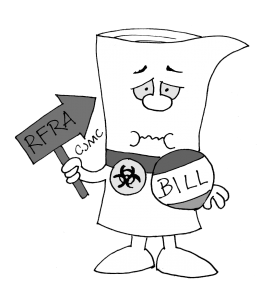In March 26th, Indiana Governor Mike Pence signed SB 101, also known as the Religious Freedom Restoration Act (RFRA), into law. There seems to be a lot of confusion regarding how this actually came about. Let’s take a look at the recent history of religious freedoms.
In 1993, President Clinton signed the original RFRA into law, following the firing of two Native Americans after they tested positive for peyote, which is smoked for religious reasons in some Native American communities. I think many of us could get behind that; after all, if a religious practice isn’t harming anyone or impeding employees’ ability to work, why should companies discriminate against it? In 1997, the law was declared to apply only at the federal level, and that states and municipalities would have to make their own judgments on how to deal with religious freedoms with regard to businesses. Last year saw the landmark Supreme Court decision on Hobby Lobby, brought about by the CEO’s assertion that his family’s religious beliefs prevented him from fulfilling the provision in the newly enacted Patient Protection and Affordable Care Act that would require companies to provide its employees with access to the morning-after pill and other emergency contraceptives. The Supreme Court ruled in favor of Hobby Lobby, declaring that companies can choose to be exempt from the law based on religious preferences, essentially declaring corporations to have the same rights as people.
This is where this issue starts to get dicey. Many contend, by that same logic, that companies wouldn’t be able to refuse service to customers who are inconsistent with their religious beliefs, such as lesbian, gay, bisexual and transgender (LGBT) couples. It becomes an even tougher pill to swallow when you realize that most of the interest groups a n d politicians supporting this bill have repeatedly called for bans on gay marriage. The American Family Association, a religious group that’s lent strong support to this bill, has compared opponents of the law to Hitler, and the executive director of the organizations’s Indiana chapter asserted that altering the bill to legislate against discrimination “could totally destroy” the bill.
There are templates for this, though. Defenders of the bill point to blue states, such as Illinois and Connecticut, as proof that fighting for religious freedoms has worked before in other states where gay rights are high on the agenda, and that the backlash to this law only happened because it was in a red state like Indiana. However, this is either an ignorant or fundamentally challenged misreading of the wording of the law. Most states with RFRA laws also make explicit provisions against discrimination, either within the language of the law or in another separate bill. SB 101 makes no such provision, and though many lawmakers have vowed to more explicitly state the intentions and parameters of the bill, little mention has been made of anti-discriminatory clauses. Now the question is: do the rights of the business owners to run their businesses as they see fit take precedence over the rights of inclusion that should belong to every American?
In an op-ed for the Washington Post, Governor Pence reiterated that he “abhor[s] discrimination” and that if he “were presented a bill that legalized discrimination against any person or group, [he] would veto it.” If he really believes that, then there are a few things that need to be addressed.
First of all, religious freedoms are hugely important, and this country was founded on protecting them; however, so is legislation against discrimination. If Governor Pence were to add in language specifying that the LGBT community is a protected class that warranted legislative armor, this would be just another bill. He’s voted against similar legislation in the past and has often decried workplace discrimination laws as a “war on religion;” so, describing the chances of this happening as “slim to none” is even giving too much hope.
Maybe this will appeal to Governor Pence a bit more— consider the fact that this version of the RFRA isn’t even good business! Since the bill was signed, numerous large organizations, from the National Collegiate Athletic O Association to Apple (CEO Tim Cook wrote an op-ed in the Washington Post denouncing the law) have strongly voiced their concerns with the law, with many even threatening to pull out of Indiana. Several states have announced possible bans on state-sponsored travel to Indiana.
Governor Pence is not a friend of the LGBT community. No matter what he has to say about “the hospitality and character of Hoosiers,” he’s still consistently spoken out and voted against gay marriage and has spearheaded a bill defining marriage as between one man and one woman. The truth is, no matter what watered down anti-discriminatory law gets written into RFRA, this is nothing more than another obstacle for the LGBT communities of Indiana.
Similar legislation is gaining steam in Utah and North Carolina, with no indication that it’ll include any anti discriminatory language. It’s in these states where, hopefully, the LGBT communities and their advocates will be able to put a stop to this hateful, discriminatory practice. As American legal scholar and novelist Garrett Epps put it so succinctly in The Atlantic this past week: “Being required to serve those we dislike is a painful price to pay for the privilege of running a business; but the pain exclusion inflicts on its victims, and on society, are far worse than the discomfort the faithful may suffer at having to open their businesses to all.”
Bernstein is a member of the class of 2018.






